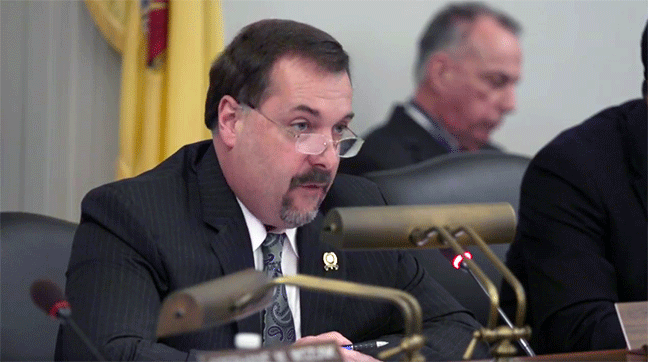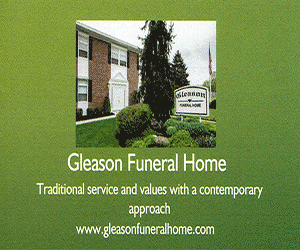Danielsen Playing Key Role In Crafting New Medical Marijuana Legislation

State Assemblyman Joe Danielsen during one of the state-wide hearings on medical marijuana his committee held.
A local state legislator looks to play a role in what promises to be groundbreaking marijuana legislation due later this year.
State Assemblyman Joe Danielsen (D-17) is working to include key segments of medical marijuana legislation he introduced into the final bill, which is now being formed in a Democratic caucus.
What’s expected to emerge from that caucus – Danielsen predicts they’ll have something in five to seven weeks – will be two pieces of legislation: one modifying current medical marijuana law, and one legalizing what used to be known as recreational, but is now referred to as “adult use” marijuana.
Danielsen, a township resident, is most concerned with the former, but he believes that some elements of his bill will be included in the latter.
“It’s on the table with other medical marijuana material and it will be part of the legislative club sandwich,” he said. “I don’t know if I will have the bacon, lettuce or tomato.”
As originally introduced in June, Danielsen’s bill, A-10, expands the number of ailments that qualify for medical marijuana treatment, broadens who can prescribe medical marijuana, increases the amount of medical marijuana that can be prescribed, expands the definition of caregiver, sets aside 15 percent of new treatment center permits for minorities, women and veterans and enhances legal protections for medical marijuana patients.
Also signing on as co-sponsors of the bill were state Assemblymen Andrew Zwicker (D-16) and Eric Houghtaling (D-11) and state Assemblywomen Eliana Pintor Marin (D-29) and Joann Downey (D-11).
State Sen. Joseph Vitale (D-19) also introduced a bill – S10 –concerning medical marijuana at about the same time. Danielsen said he revamped his bill “so as not to duplicate,” and predicted that S10 “will get modified with my material and other material.”
“In the end, nobody cares whose bill it is, as long as everybody is supporting it,” he said. “This process is delicate … we have to be very sensitive to the needs and issues of everybody.”
Danielsen said he wrote his bill with “priorities: patients, medicine, science, diversity and business success. From those priorities, I listed 40 goals and issues I wanted to address, including local control, research and development, safety issues, small business, inclusion of New Jerseyans and non-mega wealthy people, an enhancement for disabled vets, women and minority investments.”
“I focused on that first,” he said. “I also modified the application process to really diversify it and focus it on the right areas.”
Danielsen said the part of his legislation of which he is most excited has to do with creating new types of permits to grow, cultivate and sell medical marijuana. He said his plan would open up the industry to people who otherwise would not be able to enter it.
“One of the most exciting portions of my bill and what’s getting the most exciting attention from our community is my micro permit which is a research and development permit,” he said. “A permit holder can avoid much of the cost and requirements for the permit, but they would also be subject to other requirements, like a strategic partnership with a hospital, university or cancer care facility.”
“This permit would be dedicated to R&D, targeted to women, disabled veterans and minorities and local residents,” he said.
Gov. Phil Murphy in July announced that the state would license six new medical marijuana dispensaries, to go with teh ix that are already in operation.
Danielsen said the process of winning those permits can cost applicants hundreds of thousands of dollars, and creating a dispensary could cost millions. The micro permits, he said, would address that problem and open the process to people who don’t have deep pockets.
“A dispensary could cost several million dollars, a processor could be $10 million,” he said. “It’s not unheard-of for someone to spend $30 million on a cultivator, it’s $20,000 to just to submit an application. You might spend $100,000 to $150,000 on a consultant to put the application together. You might have purchased a building or signed a 10-year lease on a building. You may have signed a contract with a labor union, you may have signed employment contracts with a CPA, a law firm, lobbyists to market your application. You may have spent money on political operatives and real estate brokers to find you a location and pitch business plan to local politicians.”
“You’re spending hundreds of thousands to millions of dollars to just be a competitive applicant,” he said. “And in the end you may not be selected.”
Micro permits, on the other hand, would be far less expansive, he said. That’s mainly because the applicant would have to have a partnership with a university, cancer care center or hospital.
“This permit would be dedicated to R&D, targeted to women, disabled veterans and minorities and local residents,” he said.
The micro permits also would not be subject to the “opt-out” provision that is expected to be in the final legislation, which allows towns to decline to host a permitted facility.
“It’s simply a research and development operation,” he said. “And the micro permit has limited grow capacity, manufacturing capacity and patient dispensing capacity.”
“They can be located anywhere, as long as you have a partnership, a trial a study, an integrated curriculum, any of that,” Danielsen said.
The micro permit cost would be determined by the state Department of Health, he said.
Danielsen said that the micro permit aspect of his bill may be included in the final bill on adult use marijuana sales. He said that would be based on so-called “impact zones,” which will be determined by residents’ poverty levels.
“I focused on the medical marijuana, the non-medical marijuana advocates saw my idea and said lets synergize this concept for social justice purposes and inclusion and diversity,” he said.
“Where mine is tied to a medical R&D or academia curriculum a non-medical micro permit would be attached to impact zones across the state,” he said. “One is science, one is social justice and economics.”
Danielsen said he was inspired to make medical marijuana available to a greater number of patients by the struggles one of his daughters had with non-Hodgkin’s Lymphoma.
“My daughter was a cancer patient, and every two hours she would scream and cry, when am I getting out of here,” he said. “She was in pain, she couldn’t swallow, drink or eat, and the doctors would say when you could show me you can drink or eat we’ll let you out of here.”
“Had she been given maybe a cannabis pill, she maybe could have gotten out,” Danielsen said. “There are thousands of people every day in that scenario. For a 16-year-old girl to cry 24/7 that she can’t go home and be normal, that two hours meant everything. I wouldn’t want any 16-year-old or parent to have to listen to those cries, when she could have gotten a pill that would have decreased inflammation and pain but would have increased her appetite.”
“Those screams and cries are as vivid as if they were yesterday,” he said.



















































